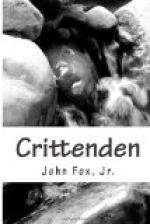the flash of trailing phosphorescent foam; a clear
sky, full of stars—the mountains clear and
radiant through sunlit vapours; camp-fires shooting
flames into the darkness, and men and guns moving
past them. Through it all he could feel his legs
moving and his feet tramping, tramping, tramping through
long green grass. Sometimes he was tramping toward
the figure of a woman, whose face looked like Judith’s;
and tramp as he could, he could never get close enough
through that grass to know whether it was Judith or
not. But usually it was a hill that he was tramping
toward, and then his foothold was good; and while
he went slowly he got forward and he reached the hill,
and he climbed it to a queer-looking little block-house
on top, from which queer-looking little blue men were
running. And now and then one would drop and not
get up again. And by and by came his time to
drop. Then he would begin all over again, or he
would go back to the coast, which he preferred to do,
in spite of his aching wound, and the long wait in
the hospital and the place where poor Reynolds was
tossed into the air and into fragments by a shell;
in spite of the long walk back to Siboney, the graves
of the Rough Riders and the scuttling land-crabs;
and the heat and the smells. Then he would march
back again to the trenches in his dream, as he had
done in Cuba when he got out of the hospital.
There was the hill up which he had charged. It
looked like the abode of cave-dwellers—so
burrowed was it with bomb-proofs. He could hear
the shouts of welcome as his comrades, and men who
had never spoken to him before, crowded about him.
How often he lived through that last proud little
drama of his soldier life! There was his Captain
wounded, and there was the old Sergeant—the
“Governor”—with chevrons and
a flag.
“You’re a Sergeant, Crittenden,”
said the Captain.
He, Crittenden, in blood and sympathy the spirit of
secession—bearer now of the Stars and Stripes!
How his heart thumped, and how his head reeled when
he caught the staff and looked dumbly up to the folds;
and in spite of all his self-control, the tears came,
as they came again and again in his delirium.
Right at that moment there was a great bustle in camp.
And still holding that flag, Crittenden marched with
his company up to the trenches. There was the
army drawn up at parade, in a great ten-mile half-circle
and facing Santiago. There were the red roofs
of the town, and the batteries, which were to thunder
word when the red and yellow flag of defeat went down
and the victorious Stars and Stripes rose up.
There were little men in straw hats and blue clothes
coming from Santiago, and swinging hammocks and tethering
horses in an open field, while more little men in
Panama hats were advancing on the American trenches,
saluting courteously. And there were American
officers jumping across the trenches to meet them,
and while they were shaking hands, on the very stroke




